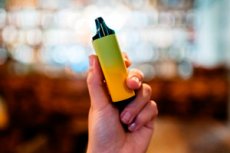
Parents who use e-cigarettes at home may be putting their children at risk of developing eczema, a new study finds.
The study, which used data from more than 35,000 US households, found that children with a parent who used e-cigarettes were 24% more likely to develop eczema (also known as atopic dermatitis) compared to children whose both parents did not use e-cigarettes.
“Our findings suggest that parental e-cigarette use is associated with the development of atopic dermatitis in children,” concluded the team led by Dr. Golyara Honari, clinical assistant professor of dermatology at Stanford University in California.
Their results were published in JAMA Dermatology.
Researchers say there is scientific basis to suggest that exposure to toxins emitted by e-cigarette vapor may cause changes in children's skin.
Previous laboratory studies have shown "increased oxidative stress in human keratinocytes and 3D skin models exposed to e-cigarette liquids and aerosol residues," they noted. Keratinocytes make up about 90% of the outer epidermal layer of the skin.
“We hypothesize that secondary exposure to e-cigarettes is associated with a similar response in children, increasing the risk of atopic dermatitis,” the Stanford team wrote.
The new study was based on data from the 2014-2018 National Health Survey, which included about 35,000 households. This is a face-to-face family survey conducted by the US Centers for Disease Control and Prevention.
Parents were asked about cases of diagnosis of eczema in their children, as well as about the use of electronic cigarettes in the home.
Overall, about 13% of children in the survey had a history of eczema, which is consistent with typical estimates.
However, children who were exposed to their parents' e-cigarettes were 24% more likely to develop eczema compared to those who were not exposed, Honari's team found. This was true even if the parent also smoked traditional cigarettes at home.
The Stanford team stressed that the study was not designed to prove cause and effect.
However, this preliminary analysis of the effects of vaping on children's skin health was necessary "given the exponentially increasing prevalence of e-cigarette use and its understudied relationship with the health of immediate family members," Honari and her colleagues noted.

